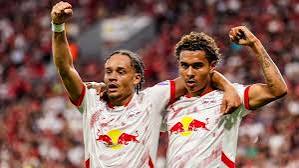In a development that has left the football world reeling, RB Leipzig has reportedly entered into groundbreaking merger negotiations with a historically significant FC, in what insiders are calling a seismic shift in the landscape of German football. This surprising move has ignited fierce debates across the sporting community and raised urgent questions about identity and tradition.
Sources close to both clubs confirm that detailed discussions are underway to blend RB Leipzig’s modern, dynamic approach with the deep-rooted heritage of the traditional FC. The proposed merger would not only involve a sharing of assets and management structures but also a bold integration of the iconic symbols, colors, and historical values that have long defined the FC.
Fans on both sides are reacting with a mix of shock and cautious optimism. Supporters of the traditional FC have expressed concerns about the dilution of their cherished identity, while RB Leipzig fans and progressive football enthusiasts see the merger as an innovative leap forward that could set new standards in the sport.
Club executives from both sides have remained tight-lipped about specifics, though a senior RB Leipzig official stated, “We are on the brink of a new era in German football. By embracing both modern ambition and historical legacy, we aim to create a model that transcends traditional boundaries.” This sentiment underscores the transformative vision behind the proposal.
Regulatory experts predict that the merger will face intense scrutiny from the German Football Association (DFB) and the Deutsche Fußball Liga (DFL), as well as potential legal challenges related to financial fair play and competition regulations. The unprecedented nature of the deal means that any final decision will likely set a far-reaching precedent for the entire European football community.
Historically, the FC in question has been synonymous with tradition and long-standing community values, which starkly contrasts with RB Leipzig’s rise as a symbol of modern, commercially-driven football. The potential merger, therefore, represents more than just a business transaction; it is a bold experiment in reconciling tradition with modernity.
Football analysts and pundits have weighed in on the proposal, with some hailing it as a visionary move that could catalyze a new wave of innovation in club management, while others warn that it risks eroding the cultural fabric that has defined German football for generations. The debate has rapidly dominated headlines and social media, reflecting the polarized sentiments among supporters.
As the negotiations continue behind closed doors, the football world awaits further details on this audacious plan. With regulatory bodies set to review the deal in the coming weeks, the final outcome remains uncertain, but one thing is clear: if successful, this merger could redefine the future of German football and challenge conventional notions of club identity across Europe.
